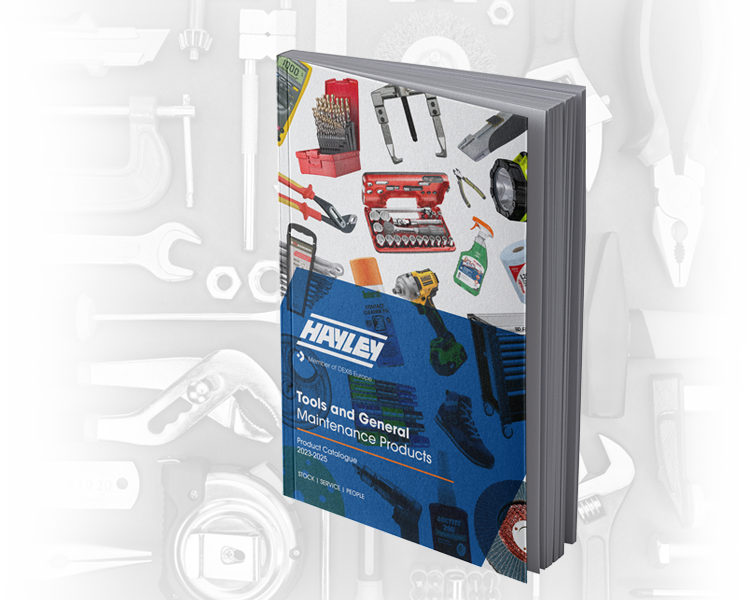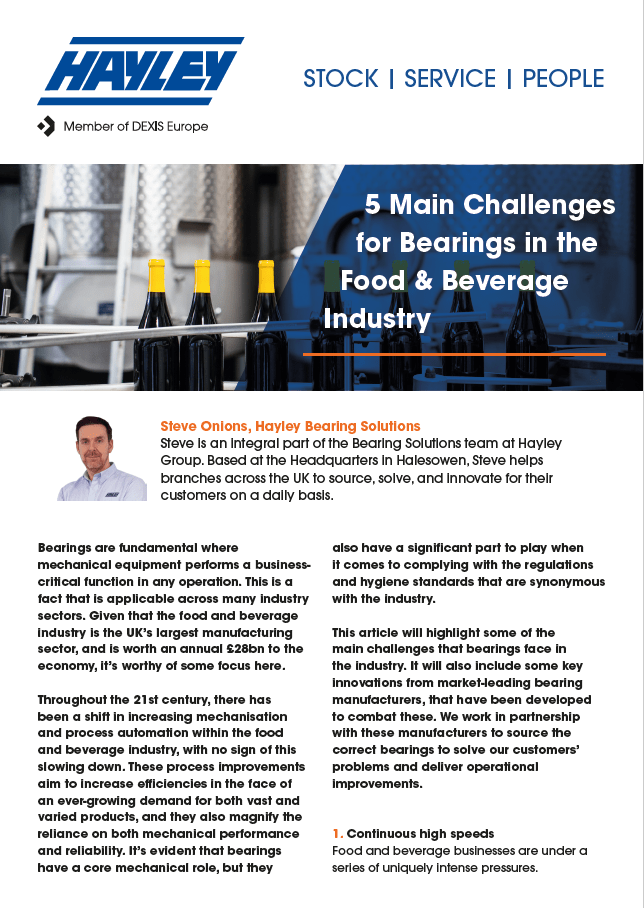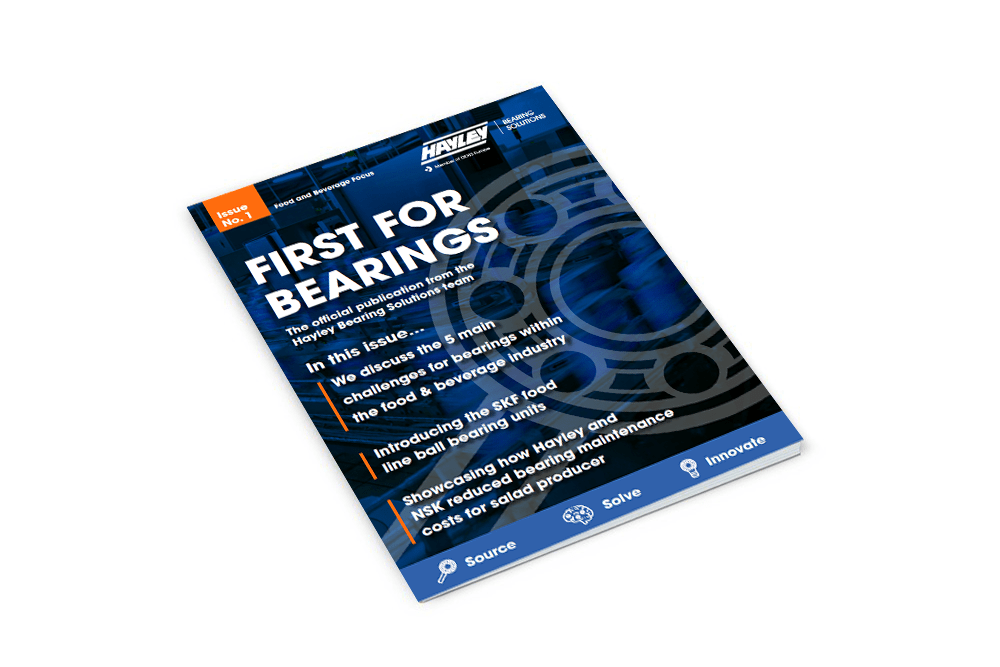by Steve Onions, Branch Support Manager - Hayley Bearing Solutions
Steve is an integral part of the Bearing Solutions team at Hayley Group. Based at the Headquarters in Halesowen, Steve helps branches across the UK to source, solve, and innovate for their customers on a daily basis.
Bearings are fundamental where mechanical equipment performs a business critical function in any operation. This is a fact that is applicable across many industry sectors. Given that the food and beverage industry is the UK’s largest manufacturing sector, and is worth an annual £28bn to the economy, it’s worthy of some focus here.
Throughout the 21st century, there has been a shift in increasing mechanisation and process automation within the food and beverage industry, with no sign of this slowing down. These process improvements aim to increase efficiencies in the face of an ever-growing demand for both vast and varied products, and they also magnify the reliance on both mechanical performance and reliability. It’s evident that bearings have a core mechanical role, but they also have a significant part to play when it comes to complying with the regulations and hygiene standards that are synonymous with the industry.
This article will highlight some of the main challenges that bearings face in the industry. It will also include some key innovations from market-leading bearing manufacturers, that have been developed to combat these. We work in partnership with these manufacturers to source the correct bearings to solve our customers’ problems and deliver operational improvements.
1. Continuous high speeds
Food and beverage businesses are under a series of uniquely intense pressures. These include the need to maintain high levels of productivity, compete pricing-wise in a highly competitive market, comply with strict safety measures, and continually diversify products in reaction to consumer demand, all while aiming to make a profit. Because of these pressures, a heavy emphasis is placed upon the productivity of machinery and personnel working in production environments.
An unrelenting requirement for high operating speeds takes its toll physically, quickly committing wear to equipment such as bearings. This presents problems around reliability and increases the threat of breakdowns and the costly hit to production that any downtime would bring. All bearings must guarantee outstanding performance by being robust enough and lubricated effectively, to withstand the high and continuous speeds required of them.
NSK Stainless Steel ES1 bearings can maintain high levels of performance in high-speed applications. They pose a durable and reliable choice with enhanced material hardness and superior corrosion resistance when compared to standard SCS440C steel bearings. Pre-lubricated with high-performance Lithium-based grease, the impact of continual high operating speeds is lessened.
2. Extreme temperatures
A second challenge for bearings within food and drink applications is the extremes of temperatures that they will be exposed to during their service life. High temperatures can be a result of continuously high running speeds but are most evident in environments where the heating, boiling, or baking is taking-place. At the other end of the scale, very low temperatures are encountered by bearings as part of freezing or refrigeration processes.
Bearings operating in environments where extremes of temperature are expected should always be correctly lubricated and protected from ambient conditions by a housing and/or a heat-shielded skirt. It is critical to know the temperature range that any bearing can operate within, as bearings can sustain catastrophic damage if they are exposed to temperatures either above or below their recommended limits.
Overheated bearings appear discoloured (usually with a blueish hue), the ring and ball materials can become annealed, and in extreme cases, can be deformed. Temperature rises can also degrade or destroy lubricants altogether. These symptoms result in a weakening of the bearing structure, a reduction in capacity, and a rapid acceleration in corrosion. All of which ultimately, lead to failure.
The TOPLINE range of deep groove ball bearings from NTN-SNR® has been developed to tackle the issue of extreme temperatures. The LT and LTZZ series can withstand temperatures down to -40oC (LT), and -60oC (LTZZ), while the HT200 series is perfect for applications experiencing temperatures up to 200oC.
3. Excessive Moisture
Product safety is vital for the industry, and so regular and thorough washdown cycles are required. Products that fail to meet strict standards risk endangering consumer health, costs the business in terms of revenue lost to product recalls, and also damages public perception of the brand.
Due to the frequency and high-pressure of washdown cycles, the integrity of bearings can easily become compromised. High-pressure cleaning can allow water to access parts of the production facility (including inside bearing units) that aren’t designed for being wet. Any water that is not properly drained has the potential to become a potentially dangerous harbour for bacteria. There is also a real risk that lubricants within bearings can be flushed-out during washdowns, jeopardising performance.
FAG Generation C deep groove ball bearings offer excellent sealing performance with the bonus of very low friction. The patented lip seal provides superb protection from water and other particulates, meaning they stay out and the bearings’ grease stays in, prolonging service life.
4. Chemical Exposure
Washdowns don’t only involve the use of water, but also chemicals in the form of detergents and sanitisers, to successfully eliminate bacteria. Harsh chemicals, acids, and alkalis can easily cause corrosion, and so bearings should have good resistance qualities to the cleaning agents being used. This is why stainless steel is often the metal of choice for bearing units in the food and beverage industry.
The major manufacturers each have ranges of stainless steel ball bearings, capable of adequately withstanding exposure to cleaning chemicals.
5. Contamination
The main source of concern in terms of contamination from bearings operating in the food and beverage industry is the lubricant used within. Food-grade lubricants are essential. These products are classified by NSF dependent on their ingredients, with the highest standard being H1. H1 lubricants are suitable for use in environments where there is a possibility of incidental contact with food or drink, with formulations only permitted to be composed of approved base stocks, additives, and thickeners (if grease). Food and beverage businesses should be certain that lubricants used in their bearings, including those that are supplied pre-lubricated, are appropriate for the application, or they risk falling victim to contamination.
Food Line ball bearing units from SKF are built using food-safe components and boast a hygienic surface design including an FDA and EC approved thermoplastic polyurethane elastomer end cover. They are also lubricated for life with an NSF H1 lubricant and housed in a blue plastic casing to help allay any fears of contamination.
Conclusion
It is evident that bearings face some tough challenges due to the unique pressures and safety regulations that food and beverage businesses have to face. The bearings highlighted in this article have several characteristics that make them ideal for overcoming some of the key issues above, but it is important that the most appropriate bearing for the application and environment must always be chosen with consideration. This is where Hayley Bearing Solutions can help. Working in conjunction with technical personnel from the major quality bearing manufacturers, we aim to deliver a bespoke solution which is ideal for our customer’s requirements.





